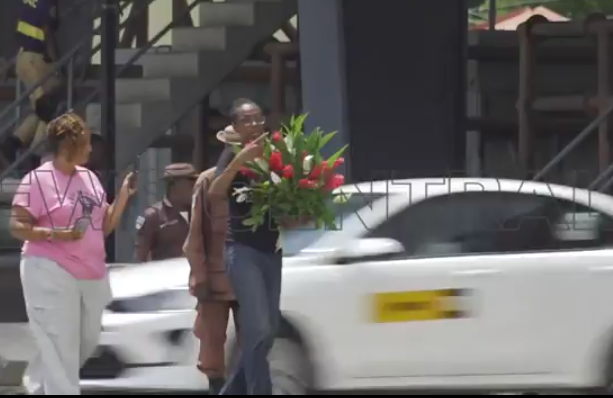
Tears, Chaos, and Brutality Return to Lekki Toll Gate as Activist Yemi Adamolekun is Assaulted by Security Officers While Honoring EndSARS Victims

The Lekki Toll Gate — a site etched in the memory of every Nigerian youth — once again turned into a scene of chaos and heartbreak as Yemi Adamolekun, one of Nigeria’s most respected civil rights activists and the Executive Director of Enough Is Enough (EiE) Nigeria, was reportedly stopped and assaulted by security officers while laying flowers in memory of those who lost their lives during the 2020 EndSARS protest. The emotional commemoration, which was meant to be a quiet moment of reflection, descended into yet another disturbing reminder of the same oppression that sparked the nationwide movement five years ago.
According to eyewitness videos that surfaced online, Yemi Adamolekun and a small group of peaceful citizens had gathered at the toll gate early in the day, carrying flowers and placards with inscriptions such as “We will never forget,” “End police brutality,” and “Justice for the fallen.” The mood was somber but dignified — an act of remembrance, not resistance. But within minutes, uniformed officers reportedly approached the group, questioning their intentions and demanding that they leave the area immediately.
Witnesses claim that when Adamolekun calmly explained that they were only there to lay flowers and pay respects, one of the officers grew aggressive, grabbing her arm and shoving her back. Another video clip shows her trying to reason with them while visibly shaken, insisting, “We are here in peace; we are not protesting.” The officers, however, appeared determined to intimidate and disrupt the simple act of remembrance.
Online outrage erupted almost instantly as the video circulated on X (formerly Twitter), Instagram, and other social platforms. Nigerians from all walks of life expressed disbelief and anger that five years after the #EndSARS protest — a movement born out of police brutality — the same force would once again harass citizens at the very spot that symbolizes their fight for justice. Many called it “a cruel irony,” a dark reflection of how little has changed since the blood-soaked night of October 20, 2020, when soldiers allegedly opened fire on peaceful protesters holding the national flag and singing the national anthem at the same location.
The incident quickly reignited nationwide conversations about freedom of expression, police reform, and the persistent culture of intimidation in Nigeria’s security agencies. Prominent figures such as Falz, Mr. Macaroni, and Rinu Oduala, who were also key voices during the EndSARS movement, shared their frustrations online, calling the act “disgraceful” and “proof that Nigeria has learned nothing.” Falz wrote, “They don’t even pretend anymore. You can’t even honor the dead without being harassed. The system stays rotten.”
The Lagos State Police Command, however, reportedly defended the officers’ actions, claiming that “no official commemoration was approved” and that “individuals were warned not to stage any gatherings without due clearance.” This statement further enraged many citizens who argued that no Nigerian should need government approval to lay flowers for the dead or to remember victims of state violence.
Yemi Adamolekun herself, speaking later after being released from brief detention, described the experience as “deeply painful.” In her words, “It’s been five years since young Nigerians came out to demand justice, and yet here we are, still being silenced, still being treated as enemies for wanting a better country.” She went on to say that the assault was not just on her person but on the very ideals of democracy and remembrance. “We came to honor the dead, not to cause trouble. But it seems in Nigeria, peace itself is now seen as a threat.”
The emotional video of Adamolekun wiping tears from her eyes as officers surrounded her sent chills down the spines of many viewers. It was a haunting reminder of the night in 2020 when social media went dark and gunshots echoed through the Lagos sky while the nation watched in horror. For many young Nigerians, that night marked the death of innocence and hope. For others, it was the birth of defiance — a call to never forget.
Now, five years later, the country appears to be circling back to the same point. Despite government promises of reform, police brutality cases continue to emerge, with few officers ever held accountable. Panels of inquiry set up after the massacre have largely faded into bureaucratic oblivion. Compensation promised to victims’ families has been inconsistent, and justice, in most cases, remains a distant dream.
The international community has also taken notice of the incident. Amnesty International condemned the assault on Adamolekun, calling it “an alarming sign that Nigerian authorities continue to disregard human rights and suppress peaceful civic action.” They urged the government to “investigate the incident immediately and ensure that citizens can commemorate the EndSARS anniversary without fear or intimidation.”
Back home, social media timelines were flooded with the hashtag #LekkiTollGate and #EndSARSMemorial, as thousands of users shared their memories of the protest, their anger at the current state of affairs, and their solidarity with Yemi Adamolekun. Many Nigerians questioned why a simple act of mourning would be met with hostility. Some even compared it to how other nations honor their fallen heroes, contrasting Nigeria’s hostility with global respect for citizens’ rights to remembrance.
For the youth who witnessed the movement firsthand, this incident felt like déjà vu. “It’s like we’re trapped in a cycle,” one user wrote. “Every year, they try to erase the truth, but we’ll keep reminding them.” Others described the government’s behavior as a deliberate attempt to erase collective memory and rewrite history, a pattern seen in the treatment of past civic movements.
As evening fell, candles were still lit in parts of Lagos, Abuja, and Port Harcourt by small groups who gathered privately to remember the lives lost in 2020. Despite the intimidation, the spirit of the movement lived on — quiet but unbroken. Videos of people kneeling in silence, holding flowers, and whispering prayers went viral, accompanied by the same chant that echoed five years ago: “Soro Soke” — Speak Up.
The assault on Yemi Adamolekun is more than just an isolated act of aggression; it is a mirror reflecting the persistent fear that grips a nation where speaking truth to power remains dangerous. It exposes a system still allergic to accountability, still uneasy with citizens’ voices, and still haunted by the ghost of Lekki. For many Nigerians, especially the younger generation, it is proof that the struggle for justice did not end in 2020 — it merely changed form.
And as the world watches the footage of Yemi Adamolekun being shoved by the very people meant to protect her, one message rings louder than ever: you can suppress the protest, but you cannot bury the truth. The flowers laid at the Lekki Toll Gate were not just petals on concrete — they were symbols of resistance, memory, and the undying call for a nation where no one is punished for simply remembering.
Video: Yemi Adamolekun was stopped and åssåultéd by security officers at Lekki Toll Gate while laying flowers to honor the victims of the 2020 EndSARS prøtest
— Nigeria Stories (@NigeriaStories) October 20, 2025
pic.twitter.com/eErGXRNtU0


